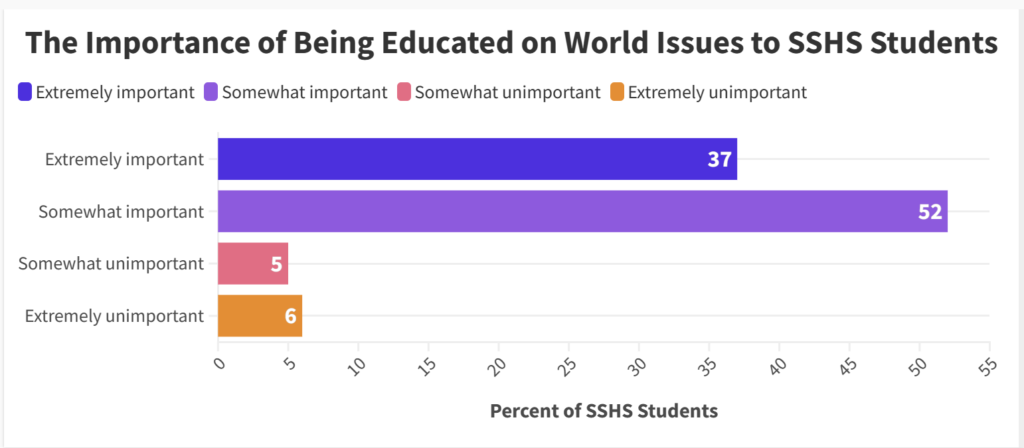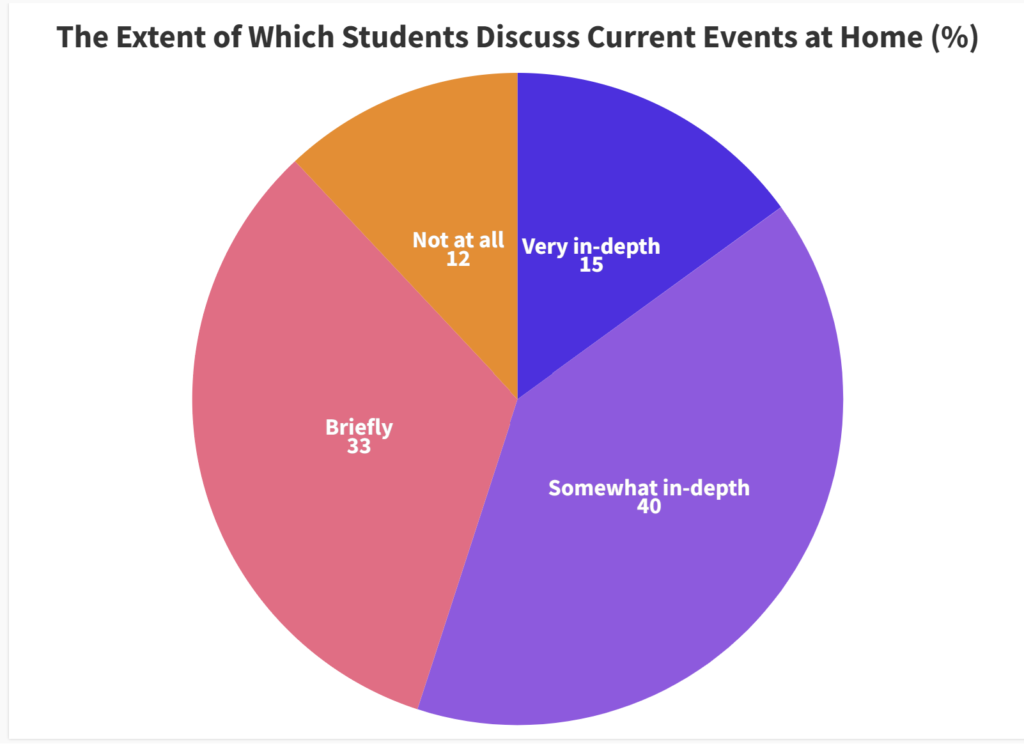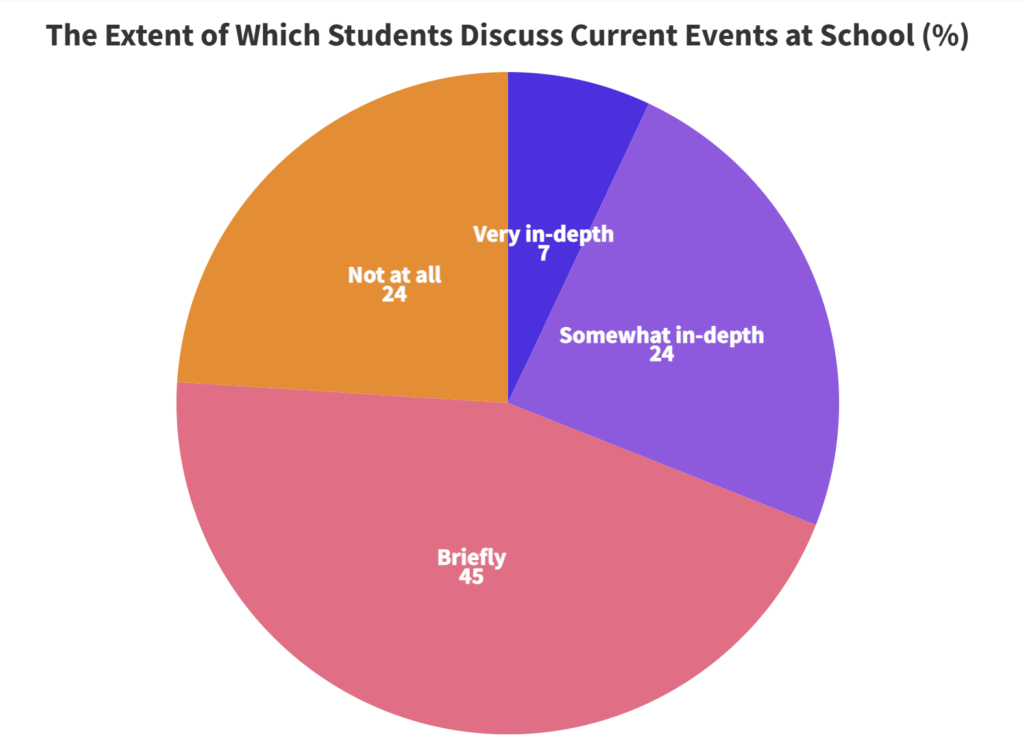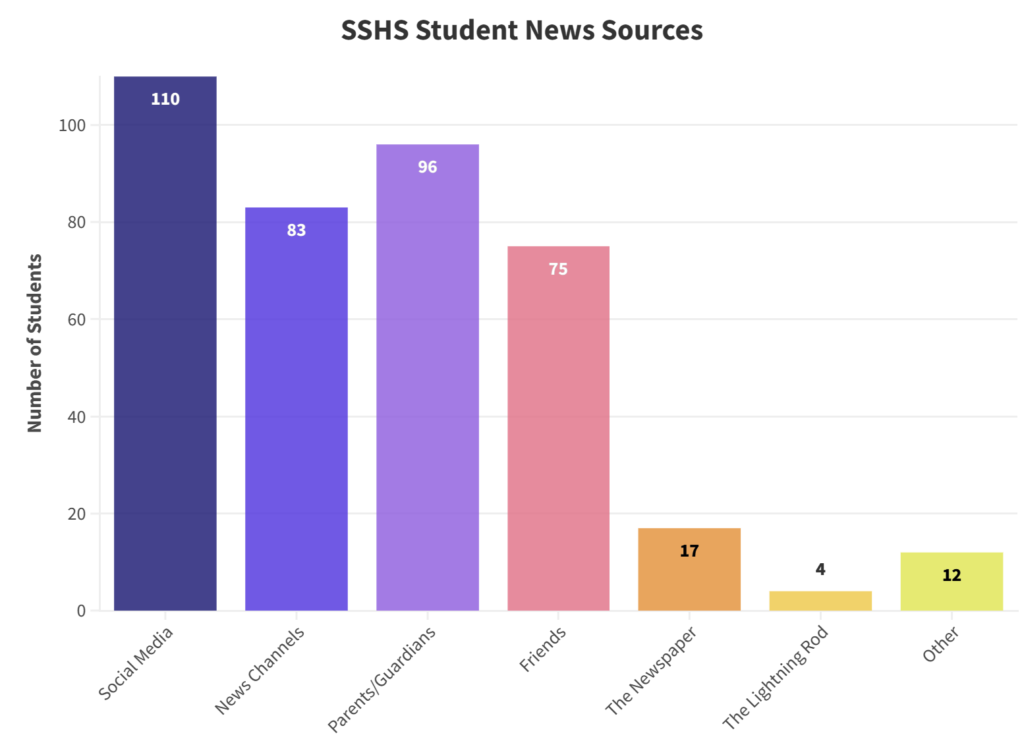March 13, 2024 by Olivia Clemmensen (‘26)
There are many major occurrences taking place in our world and we are constantly living through events that will make history. Numerous are well known across the board such as the COVID-19 pandemic or the wars in both Ukraine and Israel, but what about their details and the other issues arising in our own country and in foreign areas that some might not be as familiar with? This article will cover the controversy of bringing up these topics in school, ways to increase school-wide awareness, and the effect this knowledge has on young adults.
Flashback to 2020 when all schools across the country shut down during the beginning of a world-wide pandemic. Even though the virus was escalating quickly, our schools notified students about what was taking place, and the world was able to unite to get through this historical moment and hopefully learn from it for the future. It can be argued that the coronavirus pandemic affected all of us. It can also be argued that the crises that have been happening since the coronavirus have been affecting all of us in some way too. Even though this might not be direct like being sent away to war or mourning one of those who died in a mass shooting, these events are constantly shaping the state of the world’s political affairs, human population, and our human rights, along with questioning the ethics of each and every one of us.
An online poll was taken a month ago at Saratoga Springs High School (SSHS) consisting of questions for students of all grades to share how they receive their national and world news, how important their knowledge of these current events is to them, and to provide them with a platform for some of their own ideas on how to create more accessibility in our school to important issues happening in the world. According to the poll results, 89% of contributing students believe that education on current events is important. Many students mentioned how their knowledge of what is happening in the world can not only help them formulate their own values and opinions, but also increase their awareness of the preventative measures that can be put in place to prevent similar instances in the future.

This knowledge of the world today will not only further expand students’ education about our society and the world but will also add to the preparation for adulthood the high school provides. SSHS History teacher and department head Mr. Schorpp said that from a teacher’s viewpoint, “we [teachers] should be producing kids who are going off as 18-year-olds who are ready to be citizens, whether that’s going into higher education or the military or a career. We want [students] to be informed citizens who are ready to be adults and form their own opinions but also be a part of the government.” Another SSHS History teacher, Mr. Taormina, said, “My role as a history teacher is to help you become informed as a citizen of the United States, […] and so if you’re not informed about what’s going on in the world, then you’re not going to be qualified voters.” Students in the SSHS poll agreed with Schorpp and Taormina. In many students’ long answers, there was a collective agreement that awareness is essential, so not only are we prepared for adult life in the workforce and the changing world we live in, but also so we can prevent and fix problems that come up in our society when we are adults.
Issues such as the Ukraine/Russia and Israel/Palestine wars, Roe v. Wade, the upcoming 2024 presidential election, the banning of books, mass shootings, January 6th, Black Lives Matter, and LGBTQIA+ movements (just to name a few) are events that are right beside the coronavirus pandemic in terms of importance. They affect just as many people whether experienced firsthand or simply reading about the situation and discussing it with one’s family at their dinner table. Whatever the situation, students and adults alike should be informed about the world to further their understanding of life and how not only this country operates but how it interacts with other countries, too. Knowing that 89% of the contributing students believe education about current events is important, do we, as a student body, feel informed?
SSHS has a variety of students, and with this comes an assortment of environments they go home to every day after school, with different amounts of support and engagement. According to the SSHS poll, while about 55% of contributing students discuss current events in depth at home, this leaves another 45% of students who discuss these world issues briefly, if at all. Ideally, schools would play a larger part in filling this void, but only about 31% of the students who participated in the poll feel as if the need for current information is being met with urgency and care while they’re at school. With updates on our world in such high demand for SSHS’s high school students, our school should increase the ways students can acquire this important information. Maybe this is broadcasting current events on the morning announcements or playing news outlets on the new TVs in the cafeteria, or even starting our own school news channel where students talk about real world issues that are happening every day. By implementing some of these ideas, we could work toward a more informed student body.


Many students mentioned in the poll that their history teachers have occasional off-the-cuff conversations on current events with their classes, ranging from brief mentions to in depth discussions. These conversations were some of the ways students get their news, but not all students feel as if these conversations are being held enough. History teachers try their best to get through their courses’ required material with efficiency, but many also feel as if they should take initiative and use their time with their students to educate them on current events as well as the history of our world.
SSHS’s history teachers have also mentioned that talking about situations such as LGBTQIA+ rights, the war in Israel, and even environmental protests are just as important to a student’s education. To Mr. Taormina, “there’s a lot to learn that’s outside of the scope of just social studies, and there needs to be people in your lives- I think that all of your teachers fill that role- who can help you understand those situations… in the end, there are bigger things in life and I am just this one little sliver, so if I can help [students] develop skills to manage the world, that’s just as important as learning the gunpowder empires of the 13th century.”
The content that educators teach is necessary for students’ success in these courses, but many of SSHS’s history teachers think that what they teach about our world’s history and our world’s current events such as protests and wars are intertwined. Mr. Schorpp commented that “there’s no separating what’s happening in the world without understanding the past: there’s the cliche that history repeats itself and we’re meant to repeat it because we don’t learn any of these lessons apparently, so it’s an integral part of everything that we do [as teachers].”
By learning both the required background history of our world and the current issues that are arising in many countries now, we will be able to make connections with what we consume in news outlets and the internet, and the information we’ve learned in school. By learning both the past and present issues in our world, we will be able to connect them to future occurrences and hopefully prevent similar situations from happening when we are adults.
While it is important for young people to learn about these issues alongside the world and American history we learn at school, it can be difficult to satisfy all students when bringing up such divisive issues, so working through these conversations can be tricky for teachers. “My role as a teacher when we [classes] have these conversations is to be a moderator to make sure that yes, multiple opinions are being heard, but not being heard in a way that is not ever hateful or shaming or anything like that, and that’s delicate; but I think that’s my job,” said Taormina. It is important to have a well-rounded conversation where multiple sides are expressed, but there must be a mediator that keeps these conversations respectful and understanding, so neither side of the issue gets hurt or offended.
As explained above, these worldly issues are known to be extremely polarizing and sensitive, so how can we navigate that sensitivity in the school setting? Although many of the history teachers here at SSHS have displayed the importance of learning about current events in school, holding these conversations can be tough, especially with such a diverse student body. Mr. Jones, a government and history teacher at SSHS, said, “I think it’s a difficult topic for people [teachers] to navigate because they certainly don’t want to upset any students or come off as indoctrinating students to think that this side is right or that side is right.” Our world’s current warfare, protests and many other situations are very hard topics to bring up in school, since talking about these issues might bring up disputes between students.
Since disputes can arise between students with different views, how do teachers try and keep conversations respectful and kind? Teachers like Taormina and Jones see it as important to act as a go-between when having discussions in the classroom so students can form their own opinions, while still being respectful of other classmates’ part of different groups or beliefs. “It’s incumbent upon us [teachers] to handle everything in a balanced way,” said Schorpp, “so students aren’t coming out of the history class indoctrinated with my viewpoints.” Giving a neutral approach to these classroom discussions is important so we can walk away from a class forming our own opinions of the situation that was being discussed. We might even discover new perspectives that our peers have contributed that can help evolve our own viewpoints.
Many of the history teachers at SSHS have expressed that navigating these open conversations in their classrooms can be tough. Although this is difficult and sometimes uncomfortable for teachers, they have also expressed that it is extremely important for students to experience, so we can consume and understand information and the world in a way that prepares us for our future. “You’re young and there’s a huge world, and there’s such a ridiculous amount of information out there. You need to be given the tools to navigate that process, to understand,” said Taormina.
Although these conversations within the classroom are essential, making sure all the material for their course is covered is a priority for teachers, too. “I’m going to still cover the content that I need to get through, to be on pace with everybody so they can get to the midterm or the Regents/AP exam, but I also have a responsibility to make sure that these kids are informed world citizens and know what’s going on around them, […] so you make those choices as teachers,” Schorpp said. Balancing the lesson of the day with a spontaneous discussion with their students is something many history teachers wish to accomplish so students still learn the planned lesson, but also stay informed on current issues. If there is an issue or event that you are interested in or have questions about, bring it up in your history classes; there are guaranteed to be many other students that want to know more about the same issues that you do. For your teacher to clarify this event for your class, it can give you the information you wanted and start a discussion in which the class can engage and exchange perspectives, regardless of how sensitive the topic might seem.
Class discussions aren’t the only way students are getting information on current events, though. In classes such as Public Policy, Economics, and Participation in Government, talking about current events is nothing new. Current event articles are assigned every week so students can analyze the context of these issues and be informed about what is going on in today’s world. Although these classes are a step forward in covering and discussing current world events, they are only available to seniors, so how can students in grades 9-11 still feel informed and educate themselves outside of classroom conversations?

According to the poll surveying about 140 students at SSHS, social media, news channels, and parents/guardians are the most popular ways the contributing students obtain news. Although these ways are accessible to young adults, both social media and guardians are likely biased. In today’s world, social media is dominating lives, and the masterminds behind it all are hungry for clicks, and wisely crafted algorithms can lead you down one-sided rabbit holes. As a result, the media has become very consumer-based, meaning that not all that is uploaded to the internet is true.
SSHS sociology and psychology teacher Mr. Trombley shared his opinions on the constantly evolving internet. He said, “I think our society demands microwavable answers, that are super simplistic to very complicated issues.” These “microwavable answers” sometimes will not cover all that needs to be addressed when talking about an issue such as a war or a protest and can leave out a lot of the important facts.
Similarly, parents and guardians can also have biased opinions towards world issues, and this can influence their childrens’ thought-processes on the matter. Taormina said, “not every student has the same access to information that other students do, and we also have students that have parents that are very opinionated-as a lot of people are- and they’re getting a really one-sided view of the world as a result of that.” Even news channels such as CNN or Fox News are geared toward different political parties, and thus produce swayed opinions. “Unfortunately, if you’re a Democrat, you watch CNN, MSNBC. If you’re conservative, you get stuff from Fox or other conservative news agencies, and really the biggest issue with politics is that you get your news that best reflects your ideas; and most people fail to even try to understand the other side,” said Trombley. So, it is up to us as young adults to educate ourselves and to stay active in learning about our world so we can formulate our own opinions and beliefs on top of the conversations being had in a classroom or at home.
In the SSHS poll, many students wrote that they wanted to see more information on current events happening in our world in the Lightning Rod, so they can help educate themselves on these events in their free time by reading the school paper. Worldly issues are occasionally covered here in the Lightning Rod School Newspaper, but like teachers in many off-the-cuff conversations happening in classrooms, writers must make sure they are staying neutral when writing about certain events such as the current wars or political protests, and this can be difficult.
Contributing students of the poll suggested that the Lightning Rod could provide links to professional and school news articles or informational videos that could be reached and used in students’ off time. An unbiased, straightforward, factual section of the Rod was suggested to shed light on any issues that arise on school-wide to world platforms, that would hopefully spark more interest in the paper and further the research of these events.
In response to this, The Lightning Rod will now have a “Global Issues Update” series where I, Olivia Clemmensen, will briefly summarize issues that arise at a school, state, national, and world-wide level so SSHS students can be updated on what is happening in the world every time the Lightning Rod edition comes out. Large events like Alexei Navalny’s death, the Ukraine and Israel wars, and the upcoming presidential elections to small events like the spring SSHS student council elections and board of education meetings will be listed on these updates. Links to references and resources will be provided for each event listed to help encourage more exploration of the topic for readers.
With this, I encourage those who decide to read these updates to expand on what is summarized and further educate themselves on the matters addressed so they can get as informed on what is going on in the world as possible. PS: don’t forget to share it with your friends! Jones said that one of the best ways for students to be educated about the world is “to be active in what’s going on around them, and that’s one of the things I encourage my seniors to do, to be active participants in what is going on around them, by staying up to date on current events [on their own time].”
A diverse school setting such as SSHS is a perfect opportunity to connect with many students’ differing perspectives. If we increase the amount of engagement in conversation with fellow students and teachers about these global issues, we can foster a more enriched and informed student body. In the poll taken a month ago, students were full of ideas on how to better educate one another. Ideas ranged from creating and advertising clubs designated for talking about world issues to unblocking certain news websites on student computers so students without internet access at home can still be informed and in the loop, showing that the student body is interested in being informed on current events inside and outside of school and wants to make a change within our school to make this happen.
Teachers, parents, and students alike all play a part in educating one another so we can work towards a more informed and aware society. This is only the beginning of a discussion that will greatly impact young adults and not only help us learn about our world’s past but help us connect it to present issues and our future. Learning to navigate classroom conversations and learning how to improve the ways SSHS’s student body is informed of global issues will always be a work in progress and a challenge, but it is necessary for our growth and education as students and human beings.
“An educated, enlightened, and informed population is one of the surest ways of promoting the health of a democracy.”- Nelson Mandela
Thank you to all the SSHS students who participated in the poll and to the SSHS history teachers who contributed to this article: your input and feedback is always valued, and I hope that with this article we can take a step closer to achieving SSHS’s goals of a more informed and understanding student body.
